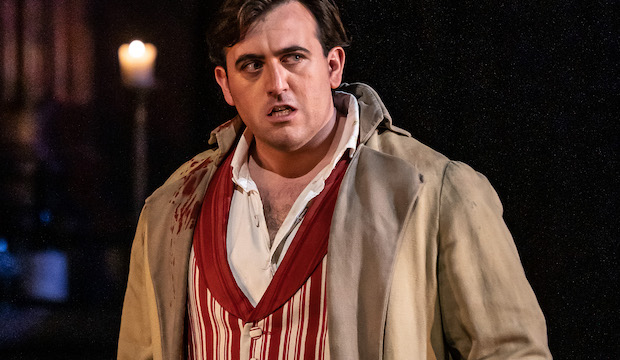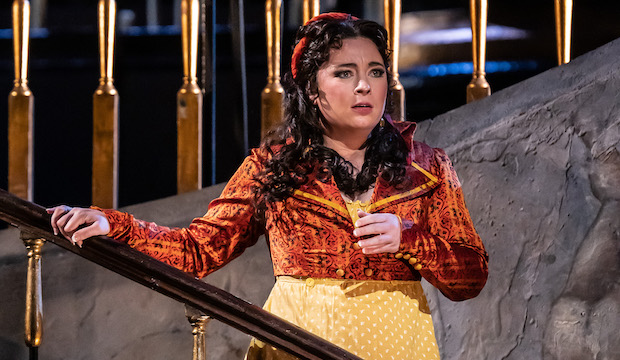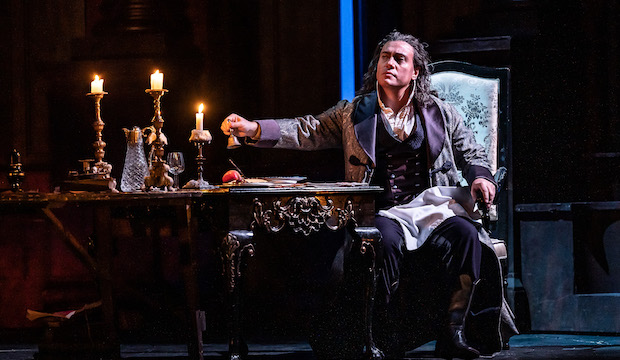Tosca, Royal Opera House review ★★★★★
Freddie De Tommaso and Natalya Romaniw bring youth and promise to a fine production of Puccini's opera
Tosca (Natalya Romaniw) is pursued by Scarpia (Erwin Schrott) in Puccini's opera at Covent Garden. Photo: Clive Barda
‘Pressure seeks me out!’ tenor Freddie De Tommaso told Culture Whisper after the performance a year ago of Puccini’s Tosca that changed his career.
Jumping into the role of artist Cavaradossi then, when US singer Bryan Hymel was too ill to continue, he wowed an astonished Covent Garden audience, and became the first British singer to take the role there for some 60 years. Opera-lovers have been watching his meteoric rise in the music world ever since.
And on the morning of an expected triumphant return to the Royal Opera House, again in Tosca, De Tommaso was defying the odds once more. This time, he was digging himself out of the snow in his home town of Tunbridge Wells, to get himself into London in time for curtain up. He made it, of course.
‘He’s a strong lad,’ a relieved Royal Opera House chief executive Alex Beard told Culture Whisper. Yes, and not only handy with a shovel. For in the role of political dissident Cavaradossi, he has grown into a musical force that could shift a snowdrift with a single aria.

Freddie De Tommaso dug himself out of the snow to sing Cavaradossi. Photo: Clive Barda
Giacomo Puccini was a diffident composer, in some ways, his eye frequently wandering to the lake outside his Tuscan home, where he fancied a bit of duck-shooting. Is this why his big numbers, the bangers like Turandot’s 'Nessun dorma' and Tosca’s 'Vissi d’arte' arrive so suddenly, unfold so quickly and are gone before you can ask for a second helping? Whatever, it gives the singer only a few bars in which to make their mark.
De Tommaso is in his element in these big moments, opening out his expansive voice with its opulent Italianate veneer. Significant, perhaps, that the tenor started out as a baritone, as if the memory of that deeper voice’s heft underpins those ringing top As.
Mario Cavaradossi is painting in the church of Sant’Andrea della Valle in a rudderless Rome terrorised by its chief of police, Baron Scarpia. He shields an escaped prisoner, arousing the jealousy of his lover, opera singer Floria Tosca, who senses there is someone else present.
Dangerous Scarpia is infatuated with Tosca, whom he intends to consume, like a meal. His obsession, and clampdown on dissidents, entraps Tosca when Cavaradossi is taken and tortured. Singing the title role in the landmark performances that close the current run of Tosca is Welsh-born soprano Natalya Romaniw. Landmark, because two British singers have not sung these principal roles together at Covent Garden for some 70 years.

Soprano Natalya Romaniw makes her Royal Opera House debut as Tosca. Photo: Clive Barda
Romaniw makes her long-awaited Covent Garden debut with one of the most demanding and best-known roles in the repertoire. She's breaking records too, as the first British soprano to sing the role since 1983. As Tosca, she is not the imperious diva of mature years, as are many who have sung this role before her. Rather, pretty much of an age with De Tommaso, she is half of a playful, romantically dreamy young couple who have to grow up fast. To the end, when Cavaradossi’s death is imminent, she girlishly believes, unlike him, in his escape.
Where would Britain be without those who brings their gifts and start a new life on these shores? Opening a popular restaurant, like De Tomasso's father from Puglia, or, teaching national songs to his granddaughter, as Romaniw’s Ukrainian grandfather did. There is a distinctive passion in Romaniw’s voice that cuts through the wall of sound in Puccini’s great orchestration. Now the hurdle of a Royal Opera is past, this proven dramatic voice will relax and reach its full breadth.
In Uruguayan bass Erwin Schrott she has a tormentor who grinningly delights in wrong. Turning 50 on the last night of this run, Schrott, with his 70s rock-star looks, is an old hand at this villainous role. That dungeon-dark voice has tormented Toscas in opera houses all over the world. It’s a great turn.

Bass Erwin Schrott is the evil Baron Scarpia. Photo: Clive Barda
Daniel Oren conducts the orchestra and chorus of the Royal Opera in Jonathan Kent’s matchless production, now on its 12th revival, with the late Paul Brown’s imposing designs, faithful to the opera’s three Roman locations, and Mark Henderson’s intensely atmospheric lighting. The conductor and the singers occasionally went their separate ways over tempi on first night.
This ROH Tosca is always my gateway opera recommendation. It's fast-moving, visually majestic, packed with music and powerfully theatrical. With the added thrill of this notable cast, these performances are very special indeed. Catch one if you can.
When De Tommaso first shot into sight, there was talk of ‘the new Pavarotti’. And yes, the muscle and the texture are comparable. But this exciting young singer is his own man. Perhaps one day, the next generation’s up-and-coming singers will be tipped as ‘the new De Tommaso’.
Tosca is sung in Italian with English surtitles. Further performances are on 15 (best availability), 18 and 21 December
Jumping into the role of artist Cavaradossi then, when US singer Bryan Hymel was too ill to continue, he wowed an astonished Covent Garden audience, and became the first British singer to take the role there for some 60 years. Opera-lovers have been watching his meteoric rise in the music world ever since.
And on the morning of an expected triumphant return to the Royal Opera House, again in Tosca, De Tommaso was defying the odds once more. This time, he was digging himself out of the snow in his home town of Tunbridge Wells, to get himself into London in time for curtain up. He made it, of course.
‘He’s a strong lad,’ a relieved Royal Opera House chief executive Alex Beard told Culture Whisper. Yes, and not only handy with a shovel. For in the role of political dissident Cavaradossi, he has grown into a musical force that could shift a snowdrift with a single aria.

Freddie De Tommaso dug himself out of the snow to sing Cavaradossi. Photo: Clive Barda
Giacomo Puccini was a diffident composer, in some ways, his eye frequently wandering to the lake outside his Tuscan home, where he fancied a bit of duck-shooting. Is this why his big numbers, the bangers like Turandot’s 'Nessun dorma' and Tosca’s 'Vissi d’arte' arrive so suddenly, unfold so quickly and are gone before you can ask for a second helping? Whatever, it gives the singer only a few bars in which to make their mark.
De Tommaso is in his element in these big moments, opening out his expansive voice with its opulent Italianate veneer. Significant, perhaps, that the tenor started out as a baritone, as if the memory of that deeper voice’s heft underpins those ringing top As.
Mario Cavaradossi is painting in the church of Sant’Andrea della Valle in a rudderless Rome terrorised by its chief of police, Baron Scarpia. He shields an escaped prisoner, arousing the jealousy of his lover, opera singer Floria Tosca, who senses there is someone else present.
Dangerous Scarpia is infatuated with Tosca, whom he intends to consume, like a meal. His obsession, and clampdown on dissidents, entraps Tosca when Cavaradossi is taken and tortured. Singing the title role in the landmark performances that close the current run of Tosca is Welsh-born soprano Natalya Romaniw. Landmark, because two British singers have not sung these principal roles together at Covent Garden for some 70 years.

Soprano Natalya Romaniw makes her Royal Opera House debut as Tosca. Photo: Clive Barda
Romaniw makes her long-awaited Covent Garden debut with one of the most demanding and best-known roles in the repertoire. She's breaking records too, as the first British soprano to sing the role since 1983. As Tosca, she is not the imperious diva of mature years, as are many who have sung this role before her. Rather, pretty much of an age with De Tommaso, she is half of a playful, romantically dreamy young couple who have to grow up fast. To the end, when Cavaradossi’s death is imminent, she girlishly believes, unlike him, in his escape.
Where would Britain be without those who brings their gifts and start a new life on these shores? Opening a popular restaurant, like De Tomasso's father from Puglia, or, teaching national songs to his granddaughter, as Romaniw’s Ukrainian grandfather did. There is a distinctive passion in Romaniw’s voice that cuts through the wall of sound in Puccini’s great orchestration. Now the hurdle of a Royal Opera is past, this proven dramatic voice will relax and reach its full breadth.
In Uruguayan bass Erwin Schrott she has a tormentor who grinningly delights in wrong. Turning 50 on the last night of this run, Schrott, with his 70s rock-star looks, is an old hand at this villainous role. That dungeon-dark voice has tormented Toscas in opera houses all over the world. It’s a great turn.

Bass Erwin Schrott is the evil Baron Scarpia. Photo: Clive Barda
Daniel Oren conducts the orchestra and chorus of the Royal Opera in Jonathan Kent’s matchless production, now on its 12th revival, with the late Paul Brown’s imposing designs, faithful to the opera’s three Roman locations, and Mark Henderson’s intensely atmospheric lighting. The conductor and the singers occasionally went their separate ways over tempi on first night.
This ROH Tosca is always my gateway opera recommendation. It's fast-moving, visually majestic, packed with music and powerfully theatrical. With the added thrill of this notable cast, these performances are very special indeed. Catch one if you can.
When De Tommaso first shot into sight, there was talk of ‘the new Pavarotti’. And yes, the muscle and the texture are comparable. But this exciting young singer is his own man. Perhaps one day, the next generation’s up-and-coming singers will be tipped as ‘the new De Tommaso’.
Tosca is sung in Italian with English surtitles. Further performances are on 15 (best availability), 18 and 21 December
TRY CULTURE WHISPER
Receive free tickets & insider tips to unlock the best of London — direct to your inbox
| What | Tosca, Royal Opera House review |
| Where | Royal Opera House, Bow Street, Covent Garden, London, WC2E 9DD | MAP |
| Nearest tube | Covent Garden (underground) |
| When |
01 Dec 22 – 21 Dec 22, Start times vary. Running time c3hr including two intervals |
| Price | £11-£235 |
| Website | Click here for details and booking |